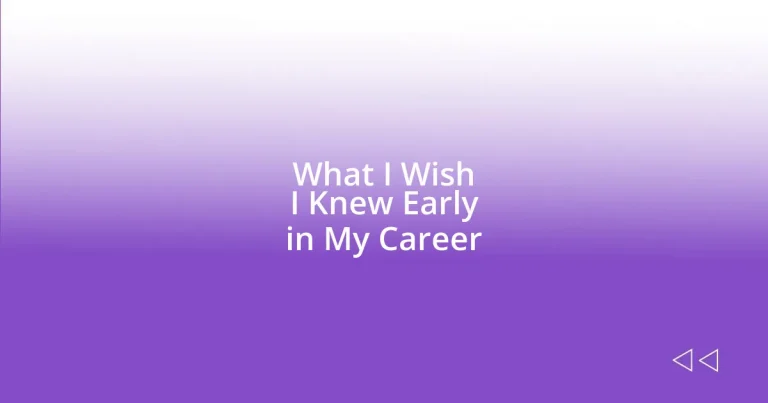Key takeaways:
- Mentorship plays a crucial role in career development by providing guidance, emotional support, and valuable lessons learned from past experiences.
- Effective networking involves genuine curiosity, thoughtful follow-ups, and authenticity to build meaningful professional relationships.
- Developing essential skills early, such as communication and adaptability, sets a strong foundation for future success and confidence in tackling challenges.
- Setting realistic and adaptable career goals can enhance motivation and help navigate unexpected changes in one’s career path.
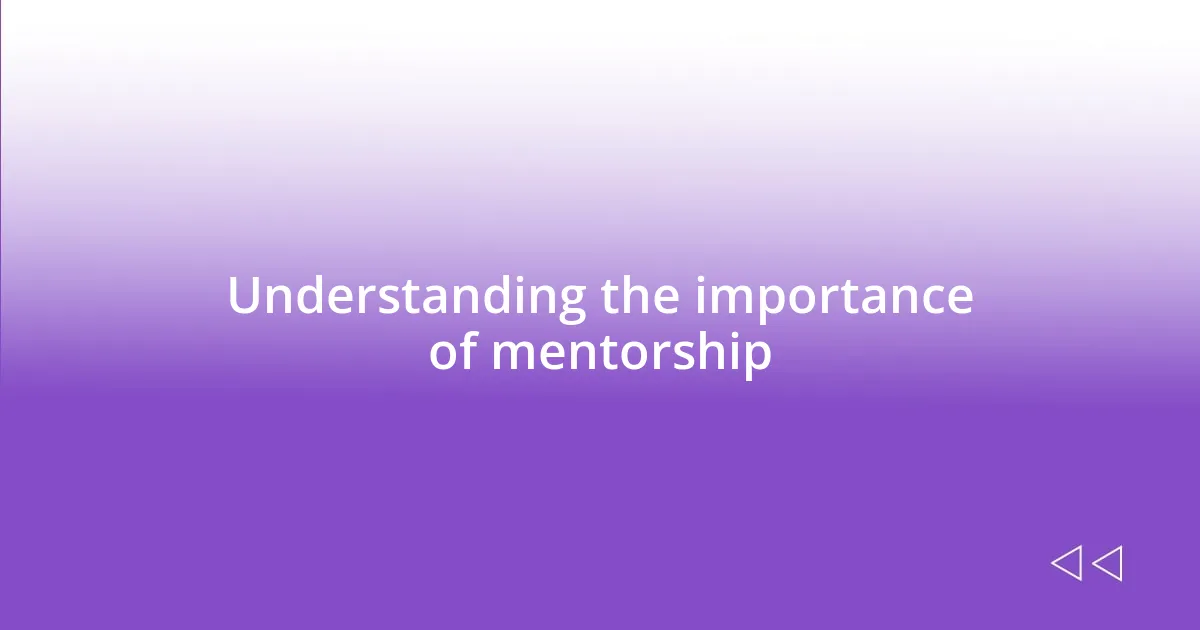
Understanding the importance of mentorship
Mentorship can be a game-changer in your career, opening doors that might otherwise stay firmly shut. I remember my first job, feeling overwhelmed and unsure. It was my mentor who not only guided me through complex tasks but also inspired confidence in my abilities. Doesn’t it make you wonder how much faster we could grow if we had someone to steer us?
When I look back, I realize that having a mentor is like having a personalized roadmap. They’ve traveled the path before us, so why not draw upon their experiences? There were countless moments when my mentor shared valuable lessons—many times learning through their mistakes—which genuinely saved me from making the same errors. It’s incredible to think about how those shared insights shaped my decisions.
Building a connection with a mentor also nurtures emotional resilience. I recall a time when I faced a significant setback; it was my mentor’s steady support that helped me regain my footing. Have you ever felt that sinking feeling after a setback? Knowing someone believes in you can transform that experience into a lesson rather than a failure. The right mentorship doesn’t just teach us—it empowers us to rise stronger.
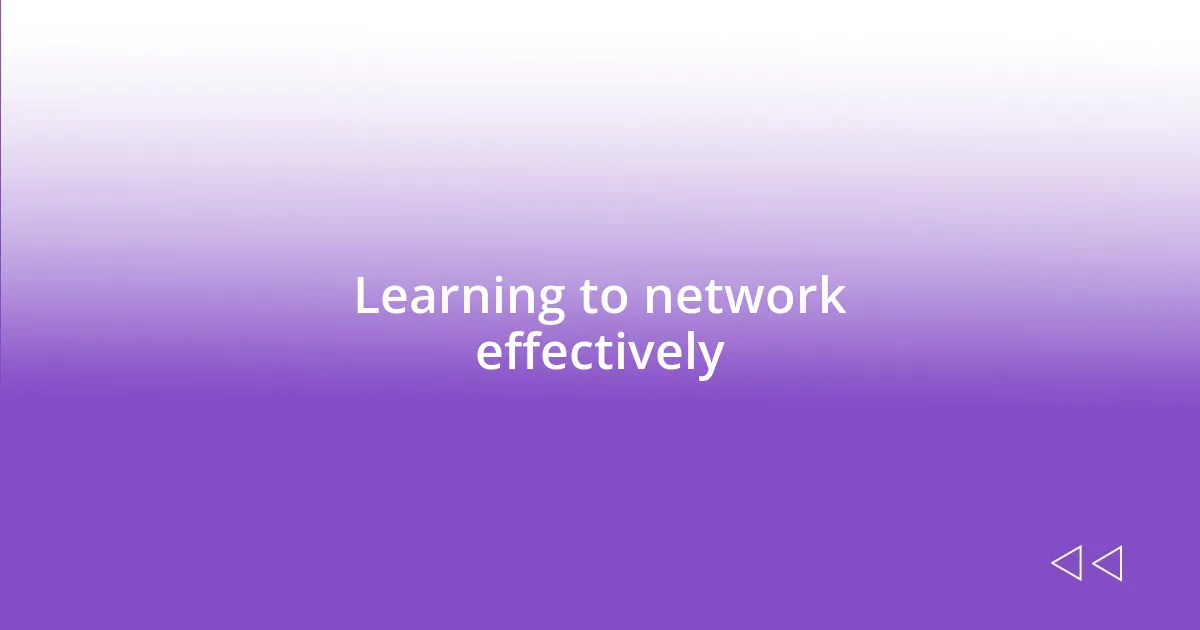
Learning to network effectively
Learning to network effectively is like cultivating a garden; you have to plant the right seeds and nurture them over time. I recall attending my first industry event, feeling utterly out of place. However, I soon realized that everyone else was just as eager to connect. Approaching someone with a genuine interest—asking about their work—created an instant bond. It’s fascinating how simple curiosity opens doors!
As I honed my networking skills, I learned to follow up with connections. I developed a habit of sending thoughtful messages after meetings. It took a bit of effort, but those small gestures turned acquaintances into meaningful relationships. It’s akin to watering those seeds you’ve planted; you’ll be surprised at how they blossom into new opportunities. Has networking ever led you to unexpected chances? In my case, it has consistently enriched my professional journey.
Over time, I’ve found that authenticity is crucial to effective networking. When I was honest about my interests and aspirations, I attracted the right people who resonated with my goals. I remember meeting a professional who seemed to share my passion for innovation, leading to collaborations that I never anticipated. Embracing authenticity not only helps you stand out but also fosters connections that can significantly impact your career.
| Networking Approach | Effectiveness |
|---|---|
| Genuine Curiosity | Creates instant bonds |
| Follow-Up | Turns acquaintances into relationships |
| Authenticity | Attracts like-minded professionals |
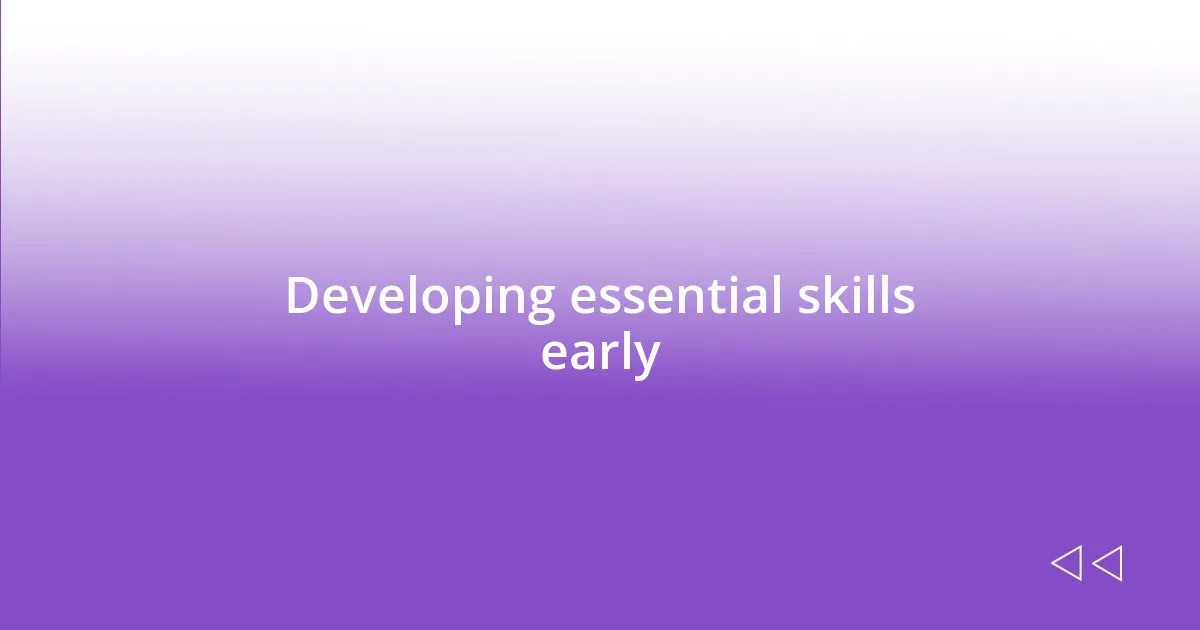
Developing essential skills early
Developing essential skills early in your career can lay the groundwork for future success. I vividly remember my first project where I had to learn time management on the fly. Juggling multiple tasks felt overwhelming, but I grasped how crucial it was to prioritize effectively. That experience taught me that mastering time management not only enhances productivity but also reduces stress. Have you ever felt the pressure of a looming deadline? It’s incredible how developing this skill early can transform your work life.
Here are some essential skills that I wish I had focused on sooner:
- Communication: Crafting clear messages can bridge gaps and fosters understanding.
- Problem-Solving: Tackling challenges head-on builds confidence and sharpens analytical thinking.
- Adaptability: Embracing change ensures you thrive in dynamic environments.
- Emotional Intelligence: Understanding your emotions and those of others enhances collaboration and leadership.
- Technical Proficiency: Gaining comfort with industry tools early can set you apart in a competitive landscape.
I genuinely believe that focusing on these skills early in one’s career was a misstep I encountered. Investing time in them now makes a world of difference in tackling today’s challenges with greater ease and confidence.
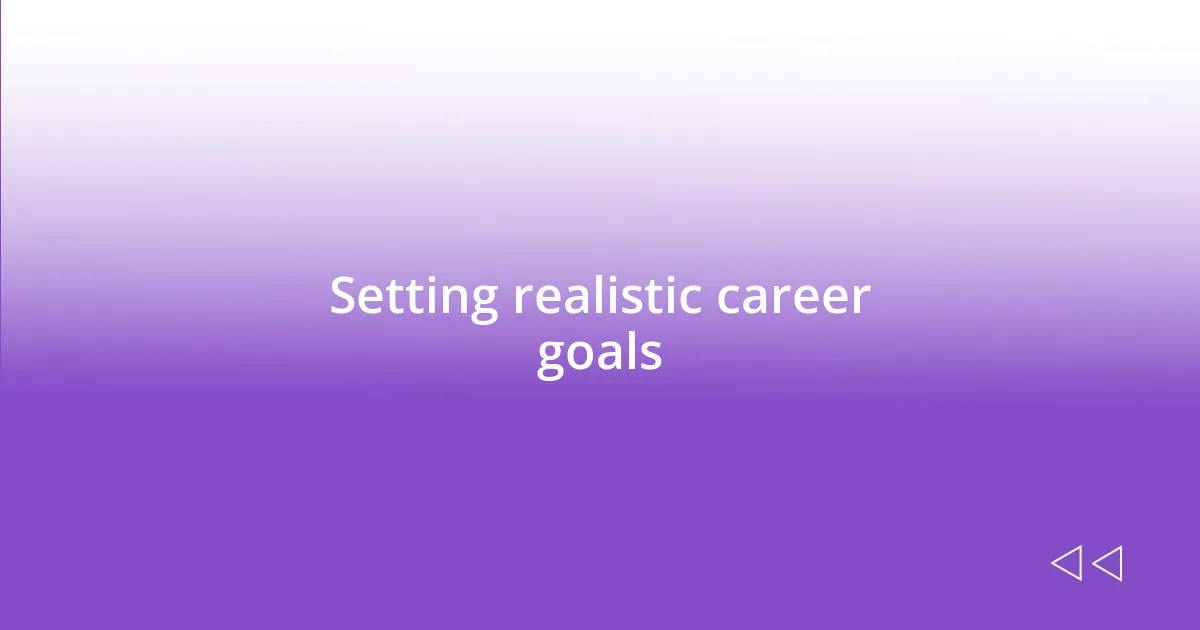
Setting realistic career goals
Setting realistic career goals can greatly influence your overall trajectory. I remember the early days of my career, filled with ambition but lacking clarity. I often set lofty goals like “becoming a manager within a year,” only to feel disheartened when I didn’t meet them. It was a gradual realization that breaking these big ambitions into manageable milestones made them not only achievable but also rewarding.
I found it incredibly helpful to use the SMART criteria—making sure my goals were Specific, Measurable, Achievable, Relevant, and Time-bound. For instance, instead of declaring, “I want to be the best in my field,” I shifted to “I will attend one industry workshop each quarter to enhance my expertise and expand my network.” Have you ever felt the satisfaction of reaching a smaller goal? It’s motivating and builds confidence, propelling you forward toward your bigger aspirations.
Reflecting on my journey, I’ve learned the importance of flexibility. While having a roadmap is essential, life often throws curveballs. Adapting goals based on new opportunities or changes in circumstances can keep your career dynamic and exciting. I remember pivoting my focus from a specific job title to gaining diverse experiences, which ultimately led to a role I never imagined I’d love. Isn’t it invigorating how embracing change can lead you to unexpected paths? Setting realistic yet adaptable goals has truly been a game-changer for me.
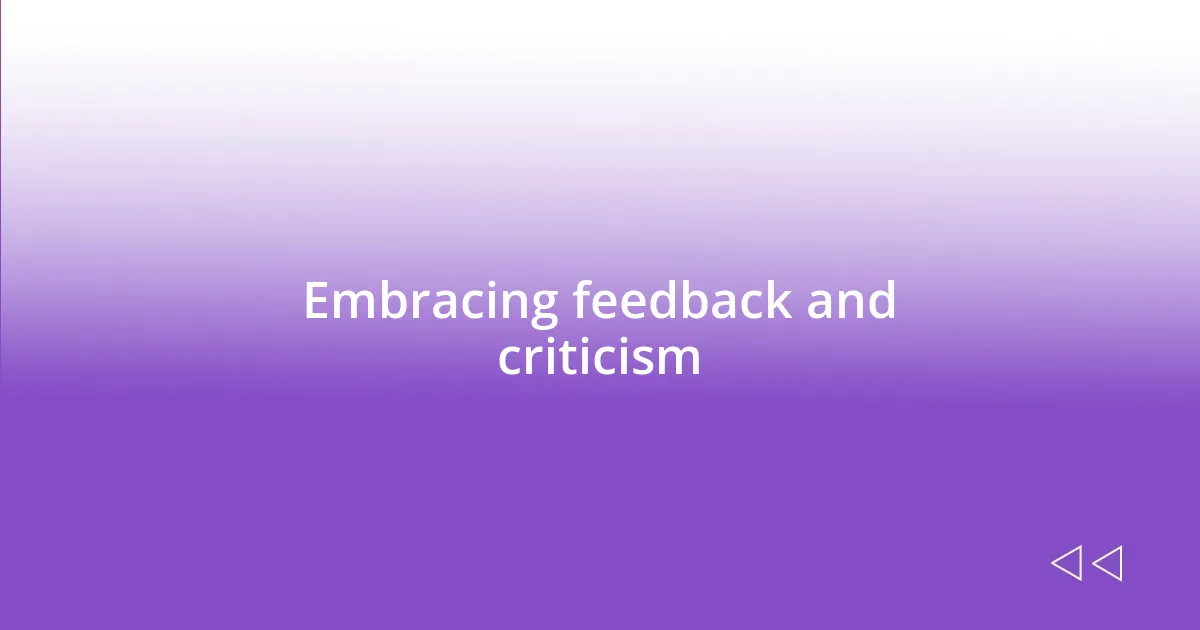
Embracing feedback and criticism
Embracing feedback and criticism has been one of the most transformative lessons in my career. In the beginning, I took criticism personally, feeling like a failure whenever someone pointed out my mistakes. Looking back, I realize now that each piece of feedback was an invaluable opportunity for growth. Have you ever noticed how a single constructive critique can shift your perspective and help you elevate your work? That’s the beauty of embracing feedback—it opens the door to improvement.
I remember a moment distinctly when my manager invited me to review a presentation I had prepared. I was proud of my work, but his suggestions to simplify my visuals and focus more on key messages felt like a punch to the gut at first. However, after I took a step back, I recognized his insights as a way to enhance my skills. The final outcome was a presentation that not only impressed my colleagues but became a turning point in my confidence. The experience taught me that feedback can refine our abilities and shape us into more effective professionals, sometimes in ways we didn’t anticipate.
It’s essential to foster an open mindset when receiving criticism. I’ve learned to ask clarifying questions and dig deeper into the feedback I receive, allowing me to transform it into actionable steps. By doing so, I’ve turned those uncomfortable moments into stepping stones for success. How can we shift our mindset to view feedback as a gift rather than a setback? By practicing gratitude for the insights others provide, we can truly harness the potential for growth that feedback holds.
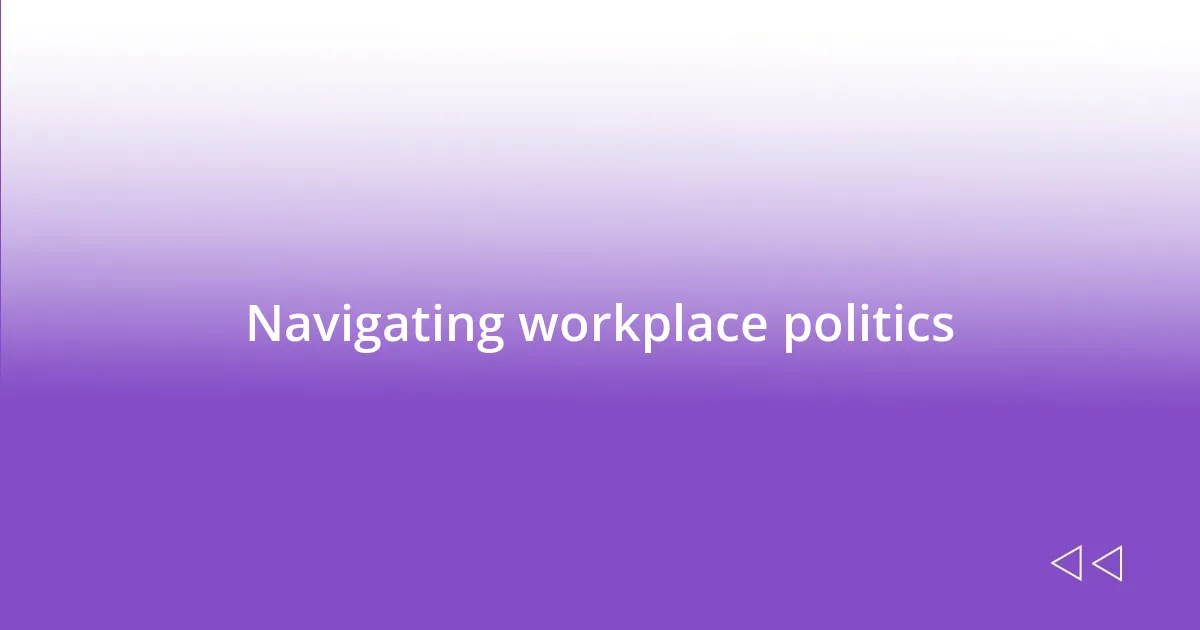
Navigating workplace politics
Navigating workplace politics can feel daunting, but it’s crucial for achieving long-term success. I remember stepping into my first corporate job, feeling overwhelmed by the dynamics around me. It was a revelation to realize that understanding the unspoken rules of engagement was just as important as my technical skills. Have you ever been unsure of how to approach someone who seemed to hold all the power? I certainly have, and it taught me to observe and learn from those who mastered the art of diplomacy.
One pivotal moment in my career came when a colleague and I were vying for the same promotion. Instead of viewing it as a competition, I chose to collaborate with him on a joint project. This decision not only helped to build a strong rapport but also showcased our combined strengths to management. I discovered that sometimes, the best way to navigate politics is through collaboration rather than confrontation. Isn’t it fascinating how cooperation can transform rivalries into alliances?
I also learned the importance of gauging the emotions of those around me. Early on, I had a habit of speaking my mind without considering how my words might be received. Over time, I’ve come to appreciate the power of emotional intelligence in the workplace. When I encountered a heated discussion during a team meeting, instead of jumping in with my opinion, I paused and asked others what they felt. This approach not only diffused the tension but also allowed for a more inclusive conversation. How often do we forget that sometimes listening is just as impactful as speaking? Embracing this mindset changed how I interacted, leading to a more harmonious and productive work environment.
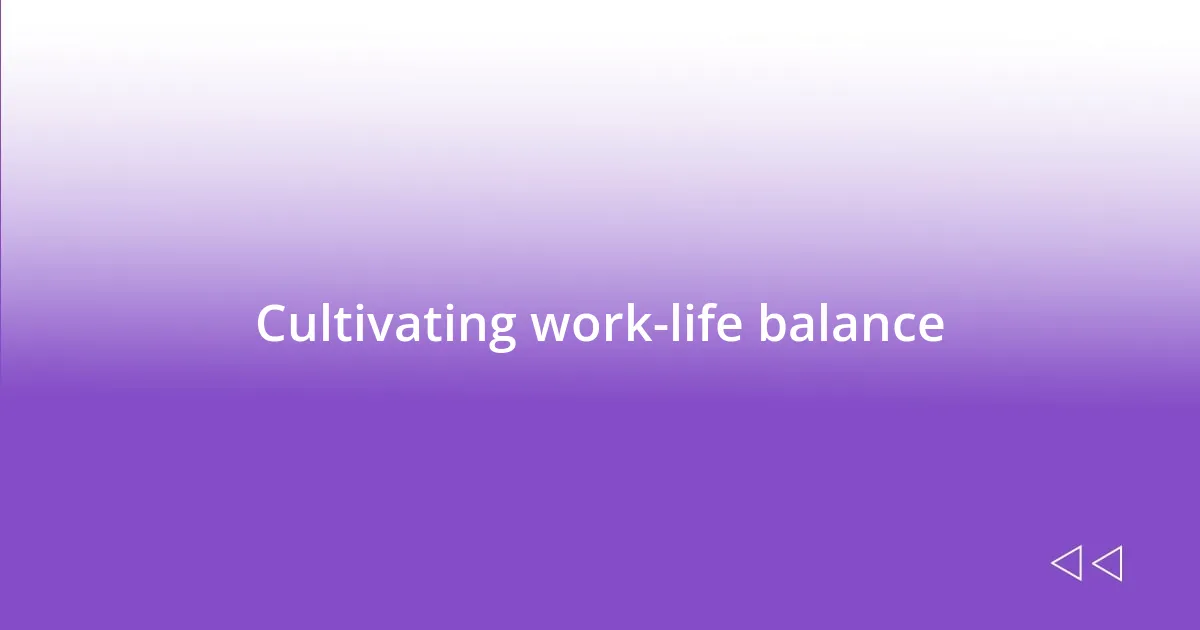
Cultivating work-life balance
Cultivating a healthy work-life balance is something I wish I had prioritized earlier in my career. There were times when I succumbed to the pressure of late-night projects or weekend work, convincing myself that it was necessary for advancement. Have you ever felt that tug-of-war between ambition and your personal life? I certainly did, and it took a toll on my well-being and relationships.
One transformative experience for me came during a particularly intense project deadline. I devoted so much time to work that I barely saw my family for weeks. When I finally stepped back to find some balance, I realized I missed more than just time with loved ones; I missed the joy and creativity that came from a refreshed mind. It was a wake-up call that reinforced my belief in setting boundaries. Sometimes, stepping away can spark the best ideas—have you noticed that too?
Over the years, I’ve incorporated simple habits to restore my balance. For instance, I started dedicating specific hours in my calendar for self-care, whether it’s exercising, reading, or simply unwinding with a favorite show. This practice not only rejuvenates my spirit but also enhances my productivity when I’m back at work. Isn’t it incredible how investing in ourselves pays dividends in all aspects of our lives? Embracing a balance isn’t just beneficial; it’s essential for sustained success and fulfillment in both my personal and professional life.












